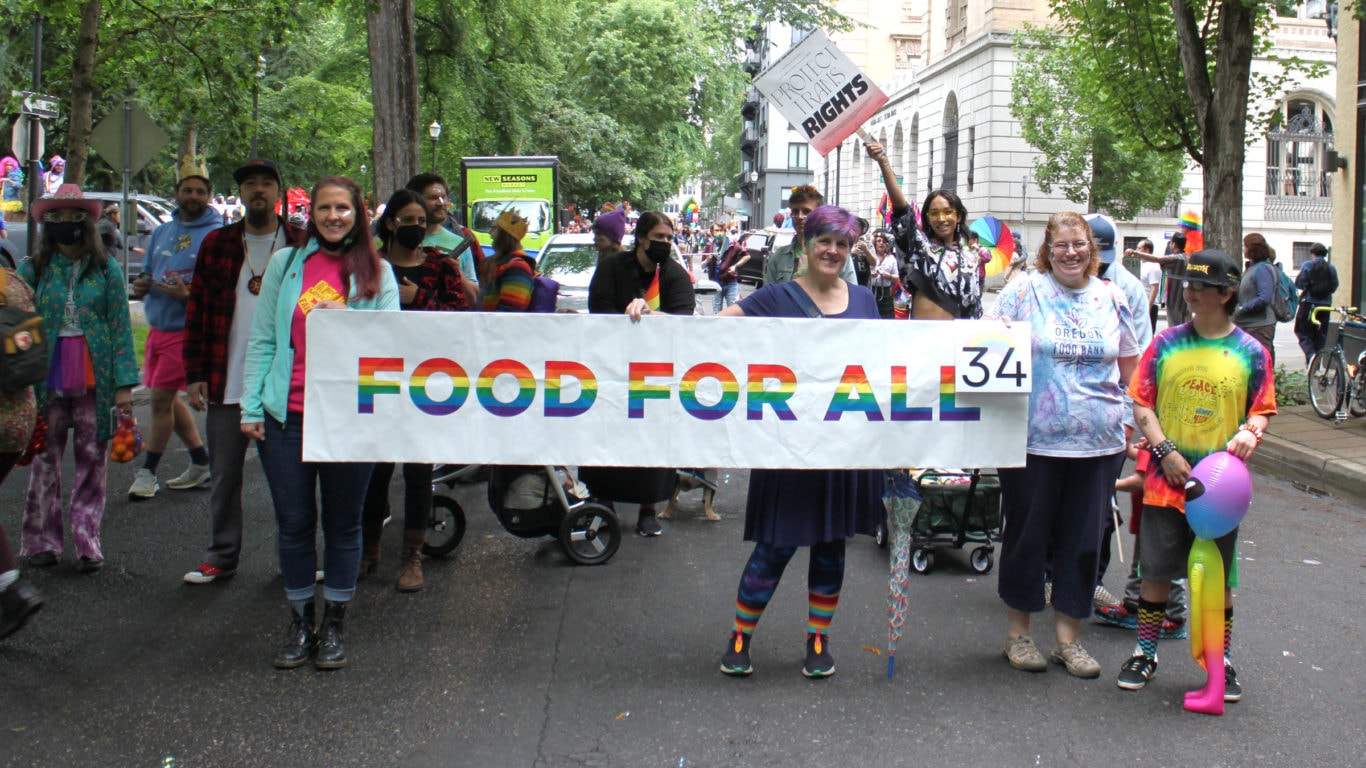Fostering Equity: Centering Gender Expansive Communities to End Hunger
Fostering Equity: Centering Gender Expansive Communities to End Hunger
Oregon Food Bank is dedicated to ending hunger and its root causes. We know that the root causes of hunger are systemic injustices — including the intersectionalities of racism, classism, sexism, settler colonialism and more — which create and perpetuate the conditions that sustain hunger and poverty. Understanding this, we commit to center those who most disproportionately experience hunger across our service area — Black, Indigenous and all People of Color, immigrants and refugees, trans and gender nonconforming individuals (including Two-Spirit folks), and single mothers and caregivers — in ways that honor and value each other and our lived experiences.
The disproportionate rates of food insecurity faced by trans and gender nonconforming, or gender expansive, individuals in Oregon highlight the urgency of targeted support and the need for transformative change. Gender expansive communities include Two-Spirit individuals, an Indigenous identity, encompassing diverse expressions of gender and spiritual connection. Those most affected by an issue possess invaluable insights and solutions.
Disproportionate Rates of Food Insecurity in Oregon:
In Oregon, gender expansive and Two-Spirit individuals face significantly higher rates of food insecurity. According to a survey conducted in 2022 by the Williams Institute at UCLA, 20 percent of transgender adults compared to eight percent of cisgender adults experienced food insecurity. This alarming disparity emphasizes the need to dismantle cis-sexism and other root causes of hunger.
Intersectionality — its Impact and its Power:
Gender expansive and Two-Spirit communities in Oregon often face intersecting forms of oppression that exacerbate food insecurity. For instance, a study conducted by the National LGBTQ Task Force found that transgender people of color, especially Indigenous, Black and Latine communities, experience disproportionately higher rates of poverty and unemployment.
Rooted in traditional Indigenous cultures and identities, Two-Spirit individuals encounter systemic discrimination, oppression and limited access to resources. The intersectionality of their gender identity and Indigenous heritage compounds the barriers they face, including higher rates of poverty, unemployment and limited access to culturally important food sources. Settler colonialism, stealth of land and traditional food systems, and the erasure of Two-Spirit identities further contribute to their experience of food insecurity. These systemic inequities compound the challenges faced by gender expansive and Two-Spirit individuals, highlighting the importance of an intersectional approach to hunger relief efforts.
Access to Culturally Appropriate Services in Oregon:
Oregon Food Bank recognizes the importance of providing culturally appropriate services to ensure equitable access to food resources. For gender expansive and Two-Spirit individuals, access to gender-affirming healthcare and supportive services is crucial. In a survey conducted by the National Transgender Discrimination Survey, 20 percent of respondents reported experiencing mistreatment or harassment when seeking food assistance. Oregon Food Bank's focus on gender expansive and Two-Spirit communities aims to create spaces where individuals can access food and resources with dignity and respect.
Advocacy for Systemic Change in Oregon:
Oregon Food Bank actively engages in advocacy efforts to address the root causes of hunger. By prioritizing the needs of gender expansive and Two-Spirit individuals, Oregon Food Bank advocates for equity-driven policies. Addressing systems rooted in oppression requires dismantling anti-Blackness, settler colonialism and practices and policies that perpetuate White supremacy. We work collaboratively to dismantle harmful systems, including with Basic Rights Oregon, Planned Parenthood Advocates of Oregon, ACLU of Oregon, Family Forward Oregon, Fair Shot For All and Bridge 13. Partnering with these organizations, Oregon Food Bank seeks to drive systemic change and support a thriving Oregon.
Individuals who hold an identity of Oregon Food Bank’s equity constituencies contribute valuable leadership to ending hunger and its root causes while also experiencing disproportionately higher rates of food insecurity and discrimination. Through following the leadership of gender expansive and Two-Spirit individuals, Oregon Food Bank taps into a wellspring of knowledge, shaping innovative and effective strategies to end hunger and its root causes.
Resources:
Basic Rights Oregon: Basic Rights has operated a dedicated Transgender Justice program since 2007. Through their legislative and policy work, as well as their educational outreach and community organizing, they’ve sought to achieve their mission of legal and lived equality for trans people.
Bridge 13: Bridge 13 provides educational workshops on the concerns/needs and joy/celebrations of LGBTQIA2S+ communities, with particular focus on how to better serve, support, and affirm LGBTQIA2S+ youth and individuals.
Portland Two-Spirit Society: Portland Two Spirit Society is a social group for LGBTQI Native American/Alaska Natives and their families.
Native Justice Coalition, Two-Spirit Taskforce: Their Two-Spirit program engages in decolonizing gender roles and identities within our Native and First Nations communities.
Northwest 2-Spirit Society: NWTSS' Mission is to educate society regarding First Nation and Two-Spirit histories and traditions, to ensure community cohesion through the promotion of health, Two-Spirit visibility, and to provide training and outreach to the Native and non-Native communities of the Northwest.
Q Center: Q Center provides community-based support for LGBTQ2SIA+ community members seeking connection and resources.
FAQ: "What is cis-gender?" There are a lot of different ways someone can express their gender or sex. Understanding gender identities, from The Trevor Project.
